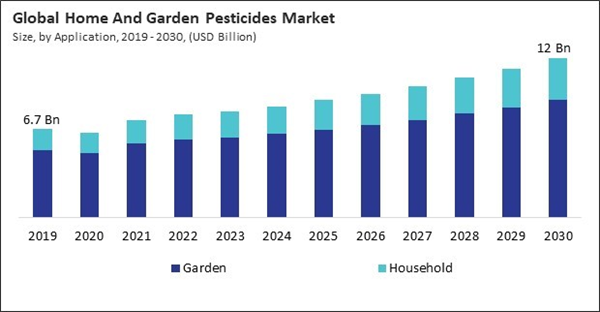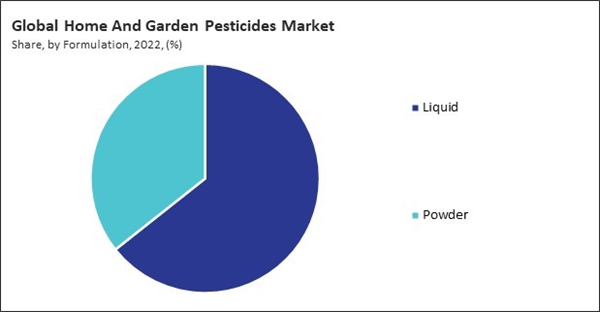Technological advancements enable the development of pesticide formulations with improved efficacy, stability, and performance. Therefore, the Insecticides segment acquired $2,249.6 million in 2022. Manufacturers can leverage innovative ingredients, delivery systems, and adjuvants to enhance the effectiveness of pest control products against a wide range of pests while minimizing environmental impact and non-target effects. Advanced technologies allow for developing targeted pest control solutions that selectively target specific pests while minimizing harm to beneficial organisms and non-target species. Precision application techniques like bait stations, pheromone traps, and biopesticides enable more precise pest management with reduced pesticide use and collateral damage.
An increasing number of individuals opt to transform their outdoor living areas into entertainment, recreation, and relaxation areas. Homeowners seek to enhance their outdoor environments with gardens, lawns, patios, and landscaping features, driving demand for gardening and landscaping products, including pesticides. Homeowners place a premium on their properties' aesthetic and curb appeal, recognizing the value of well-maintained gardens and landscapes in enhancing property value and curb appeal. Landscaping trends such as manicured lawns, ornamental plants, and decorative features contribute to the overall aesthetics of residential properties. However, maintaining these landscapes often requires pest control measures to preserve plant health and appearance. Additionally, the construction of new residential properties creates additional habitats for pests such as insects, rodents, and termites. As construction disrupts natural habitats and introduces conducive environments for pest infestations, homeowners and developers often require pest control solutions to prevent and manage pest problems in newly constructed homes and landscapes. Pests such as termites, carpenter ants, and wood-boring beetles threaten the structural integrity of residential buildings by causing damage to wooden structures, foundations, and building materials. Homeowners and builders rely on pesticides to protect homes from structural damage and costly repairs associated with pest infestations.
However, Pesticides contain active ingredients and chemical compounds that can pose risks to human health upon exposure. Acute and chronic health consequences may result from pesticide ingestion, dermal contact with residues, inhalation of vaporized pesticides, or ingesting contaminated food or water. These effects may include respiratory complications, skin irritation, neurological conditions, and reproductive problems. Consumers, homeowners, and applicators may be reluctant to use pesticides due to concerns about potential health risks to themselves and their families. Inadequate training, lack of safety precautions, and non-compliance with label instructions contribute to pesticide-related accidents and incidents. Therefore, health and safety risks are hampering the growth of the market.
By Application Analysis
Based on application, the market is categorized into garden and household. The home segment witnessed a promising revenue share in the market in 2022. Homeowners are becoming more aware of pests, including insects like ants, cockroaches, termites, spiders, and rodents. These pests can potentially induce nuisance, damage property, and pose health hazards. As a result, there is a growing demand for effective pest control solutions specifically designed for indoor environments.By Formulation Analysis
On the basis of formulation, the market is segmented into powder and liquid. In 2022, the liquid segment attained the largest revenue share in the market. Liquid pesticides can penetrate plant tissues and soil more effectively than other formulations, such as powders or granules. This maximizes the efficiency with which the active ingredients are assimilated by plants and target pests, thereby enhancing pest control results. Liquid pesticides often have fast-acting properties, allowing for rapid pest knockdown and control.By Distribution Channel Analysis
By distribution channel, the market is divided into online and offline. The online segment procured a remarkable revenue share in the market in 2022. Online shopping offers unparalleled convenience, allowing consumers to browse, compare, and purchase home and garden pesticides from the comfort of their homes or on the go. These platforms offer consumers the flexibility to purchase at their preferred time and place, unrestricted by physical store locations or operating hours. Additionally, online platforms facilitate easy price comparison, allowing consumers to compare prices across retailers and find the best deals quickly.By Type Analysis
Based on type, the market is divided into herbicides, insecticides, fungicides, and fumigants. In 2022, the herbicides segment garnered the highest revenue share in the market. Herbicides are commonly used to control lawn weeds, preventing them from competing with grass for nutrients, water, and sunlight. By selectively targeting particular species of weeds while avoiding damage to vegetation, these herbicides offer a viable solution for maintaining a lush and weed-free lawn. Herbicides help control weed growth in garden beds, flower beds, and landscaped areas, where weeds can quickly overtake desirable plants. By selectively targeting weeds, herbicides help maintain the aesthetic appeal of gardens and landscaping features.By Regional Analysis
Region-wise, the market is analyzed across North America, Europe, Asia Pacific, and LAMEA. The North America region witnessed the maximum revenue share in the market in 2022. North America experiences many climates, from arid deserts to humid subtropical regions. This diversity of climates creates varied pest challenges throughout the continent, including insects, weeds, and plant diseases. As a result, homeowners and gardeners require a variety of pesticides to manage pests effectively in different environmental conditions.Recent Strategies Deployed in the Market
- Apr-2023: Syngenta AG Group signed a partnership with Biotalys, a biotech company developing biocontrol solutions for sustainable agriculture. Under this partnership, by integrating Syngenta's established research and development expertise with the revolutionary protein-based advancements of the Biotalys AGROBODY™ platform, Syngenta would be able to tackle the essential farmer requirements worldwide.
- Jan-2023: BASF SE launched Axalion™ Active, a new insecticide active ingredient that effectively manages detrimental piercing and sucking insect pests. The Axalion-containing products find application in fruits, vegetables, soybeans, legumes, cotton, cereals, beets, oilseed rape, and ornamental plants.
- Jun-2022: BASF SE took over Horta S.r.l., a digital platform that facilitates urban gardening by providing resources and guidance for cultivating plants in small spaces. Through this acquisition, BASF would endeavor to harness the growth potential and opportunities presented by digitalization for the advantage of its customers, with Horta being a valuable addition to our digital farming portfolio in this context.
- Apr-2021: Central Garden & Pet Company came into partnership with Profitero, Inc., a global provider of e-commerce analytics and insights, empowering brands to optimize their online performance and drive sales growth. Through this partnership, Central Garden would be able to enhance insight into their consumers' digital shopping journey, leading to amplified basket sizes, increased attachment rates, and ultimately, business growth.
- Dec-2020: Central Garden & Pet Company took over Green Garden, a leading supplier of seed packets and seed starter products for flower and vegetable gardens. Through this acquisition, the inclusion of Green Garden's renowned and reliable seed and seed starting lines for vegetables, herbs, and flower gardens will broaden Central Garden's product range into a compelling adjacent garden segment, enhancing their presence with important retail partners.
List of Key Companies Profiled
- BASF SE
- Central Garden & Pet Company
- Bayer AG
- Syngenta AG Group
- Reckitt Benckiser Group PLC
- DuPont de Nemours, Inc.
- Sumitomo Chemical Co., Ltd.
- Willert Home Products
- S.C. Johnson & Son, Inc.
- The Scotts Miracle-Gro Company
Market Report Segmentation
By Application- Garden
- Household
- Liquid
- Powder
- Offline
- Online
- Herbicides
- Insecticides
- Fungicides
- Fumigants
- North America
- US
- Canada
- Mexico
- Rest of North America
- Europe
- Germany
- UK
- France
- Russia
- Spain
- Italy
- Rest of Europe
- Asia Pacific
- China
- Japan
- India
- South Korea
- Australia
- New Zealand
- Rest of Asia Pacific
- LAMEA
- Brazil
- Argentina
- UAE
- Saudi Arabia
- South Africa
- Nigeria
- Rest of LAMEA
Table of Contents
Companies Mentioned
- BASF SE
- Central Garden & Pet Company
- Bayer AG
- Syngenta AG Group
- Reckitt Benckiser Group PLC
- DuPont de Nemours, Inc.
- Sumitomo Chemical Co., Ltd.
- Willert Home Products
- S. C. Johnson & Son, Inc.
- The Scotts Miracle-Gro Company










